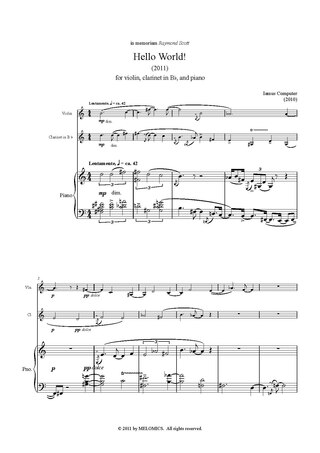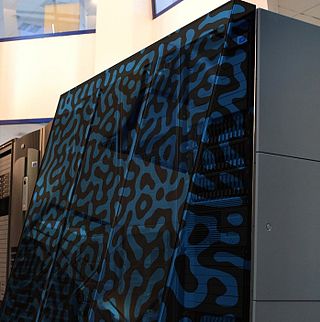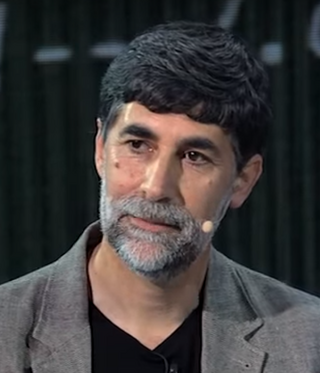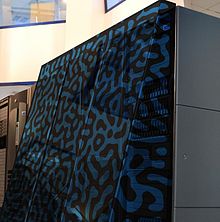Computer music is the application of computing technology in music composition, to help human composers create new music or to have computers independently create music, such as with algorithmic composition programs. It includes the theory and application of new and existing computer software technologies and basic aspects of music, such as sound synthesis, digital signal processing, sound design, sonic diffusion, acoustics, electrical engineering, and psychoacoustics. The field of computer music can trace its roots back to the origins of electronic music, and the first experiments and innovations with electronic instruments at the turn of the 20th century.
A music sequencer is a device or application software that can record, edit, or play back music, by handling note and performance information in several forms, typically CV/Gate, MIDI, or Open Sound Control (OSC), and possibly audio and automation data for digital audio workstations (DAWs) and plug-ins.
Algorithmic composition is the technique of using algorithms to create music.
David Cope is an American author, composer, scientist, and Dickerson Emeriti Professor of Music at UC Santa Cruz. His primary area of research involves artificial intelligence and music; he writes programs and algorithms that can analyze existing music and create new compositions in the style of the original input music. He taught the groundbreaking summer workshop in Workshop in Algorithmic Computer Music (WACM) that was open to the public as well as a general education course entitled Artificial Intelligence and Music for enrolled UCSC students. Cope is also co-founder and CTO Emeritus of Recombinant Inc., a music technology company.
The Nannerl Notenbuch, or Notenbuch für Nannerl is a book in which Leopold Mozart, from 1759 to about 1764, wrote pieces for his daughter, Maria Anna Mozart, to learn and play. His son Wolfgang also used the book, in which his earliest compositions were recorded. The book contains simple short keyboard pieces, suitable for beginners; there are many anonymous minuets, some works by Leopold, and a few works by other composers including Carl Philipp Emanuel Bach and the Austrian composer Georg Christoph Wagenseil. There are also some technical exercises, a table of intervals, and some modulating figured basses. The notebook originally contained 48 bound pages of music paper, but only 36 pages remain, with some of the missing 12 pages identified in other collections. Because of the simplicity of the pieces it contains, the book is often used to provide instruction to beginning piano players.
Evolutionary music is the audio counterpart to evolutionary art, whereby algorithmic music is created using an evolutionary algorithm. The process begins with a population of individuals which by some means or other produce audio, which is either initialized randomly or based on human-generated music. Then through the repeated application of computational steps analogous to biological selection, recombination and mutation the aim is for the produced audio to become more musical. Evolutionary sound synthesis is a related technique for generating sounds or synthesizer instruments. Evolutionary music is typically generated using an interactive evolutionary algorithm where the fitness function is the user or audience, as it is difficult to capture the aesthetic qualities of music computationally. However, research into automated measures of musical quality is also active. Evolutionary computation techniques have also been applied to harmonization and accompaniment tasks. The most commonly used evolutionary computation techniques are genetic algorithms and genetic programming.

Mozart the music processor is a proprietary WYSIWYG scorewriter program for Microsoft Windows. It is used to create and edit Western musical notation to create and print sheet music, and to play it via MIDI.

Computational creativity is a multidisciplinary endeavour that is located at the intersection of the fields of artificial intelligence, cognitive psychology, philosophy, and the arts.
John Woolrich is an English composer.

Iamus is a computer cluster located at Universidad de Málaga. Powered by Melomics' technology, the composing module of Iamus takes 8 minutes to create a full composition in different musical formats, although the native representation can be obtained by the whole system in less than a second. Iamus only composes full pieces of contemporary classical music.

"Hello World!" is a piece of contemporary classical music for clarinet-violin-piano trio composed by Iamus Computer in September 2011. It is arguably the first full-scale work entirely composed by a computer without any human intervention and automatically written in a fully-fledged score using conventional musical notation. Iamus generates music scores in PDF and the MusicXML format that can be imported in professional editors such as Sibelius and Finale.

Iamus is the first studio album composed using Iamus, a computer cluster designed by the University of Malaga which creates contemporary classical music. The pieces are composed using melomics computational system, and are entirely computer generated, with no human input.

Melomics109 is a computer cluster located at Universidad de Málaga used to create digital music. It is part of the Spanish Supercomputing Network, and has been designed to increase the computational power provided by Iamus. Powered by Melomics' technology, the composing module of Melomics109 is able to create and synthesize music in a variety of musical styles. This music has been made freely accessible to everyone. The cluster consists of three cabinets with customized front panels.

0music is the second album produced with Melomics technology. While the first one is a compilation of contemporary pieces fully composed by Iamus, 0music compiles pieces of popular genres, composed and interpreted without any human intervention by Melomics109, a computer cluster hosted at the University of Malaga. The pieces in this album, and all the production of Melomics109, is distributed under CC0 licensing, and it is available in audible and editable (MIDI) formats.
Anvil Studio is a multitrack MIDI and audio editing, digital audio workstation program that runs on Microsoft Windows. It is developed by Willow Software, based in Shoreline, Washington, U.S.A.
Maschine is a hardware/software digital audio workstation developed by Native Instruments. Maschine consists of a controller that connects to the included sequencing software, which can be installed on any compatible computer or laptop.

Black MIDI is a music genre consisting of compositions that use MIDI files to create a song or a remix containing a large number of notes. People who make Black MIDIs are known as blackers. However, there are no specific criteria of what is considered "black"; as a result, pinpointing the exact origin of Black MIDI is impossible.

The Viola Sonata by Graham Waterhouse, entitled Sonata ebraica, was written in 2012 and 2013, and premiered in Munich in 2013. It was recorded in 2015 by Hana Gubenko and Timon Altwegg who commissioned and premiered it.
La casa imaginaria is a Spanish-language opera by Gustavo Díaz-Jerez to a libretto by Pilar Mateos based on the 1994 short story by the same author. It premiered at the Auditorio de León (Spain) on November 9, 2018, and was sold out for its two performances. The music uses musical material drawn from algorithmic procedures, as well as Iamus computer bio-inspired approach to music composition.

Francisco José Vico Vela is a scientist and engineer who is a full professor of artificial intelligence at the University of Málaga. As a researcher, Vico is founder and head of the Biomimetics and EdTech research groups at the University of Málaga, and founder and CEO of the university spin-offs Melomics Media and Digitomica as an entrepreneur. His work is mostly known for using evolutionary computation in the field of automated computer composition and industrial design.











